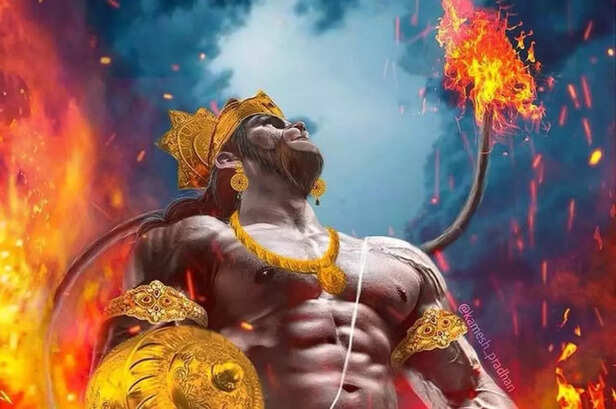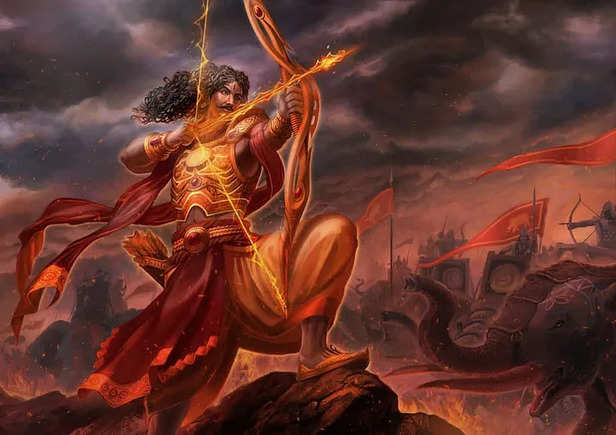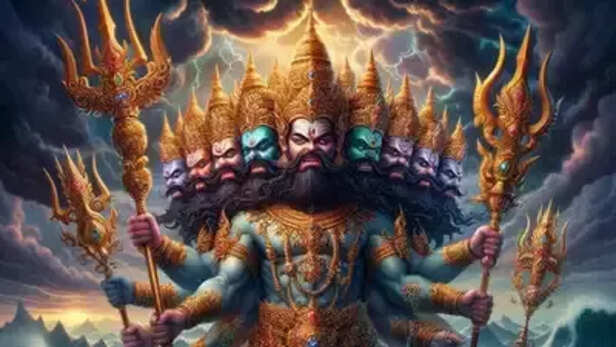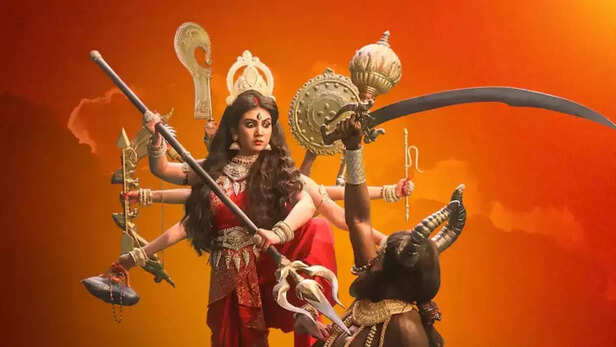Doubt is The Poison That Kills a Warrior Before The Battle Begins
Ankit Gupta | Apr 21, 2025, 12:51 IST
( Image credit : Timeslife )
Doubt is the silent enemy that destroys a warrior even before the battle begins. Drawing from the Mahabharata, Ramayana, and Devi traditions, the article examines how legendary figures like Arjuna, Hanuman, Karna, Ravana, and Durga navigate doubt, and how their stories reveal deeper spiritual and psychological truths. The piece emphasizes that overcoming self-doubt is the first step toward victory, both on the battlefield and in life.
विषादो न हन्ता शत्रोः, आत्मानं प्रथमं जयेत्।
संशयो हि नरकस्य द्वारं, श्रद्धा मोक्षस्य साधनम्॥
“Despair never slays the enemy. First, conquer thyself. Doubt is the gate to hell, and faith the path to liberation.”
Battles in mythology are rarely just about weapons, armies, or strategies. Before the chariot wheels screech and conches are blown, there is another war — an invisible, yet fatal one — fought in the mind and heart of the warrior.
Doubt is that insidious toxin. It cripples the hand before the sword is raised. It drains vitality, clouds judgment, and detaches the soul from its higher calling. Myth after myth, Indian scriptures show us that the greatest wars are not won by the sharpness of arrows, but by the clarity of the spirit.
This article journeys through these inner wars — from Arjuna to Karna, Hanuman to Ravana, and the Devi herself — to show how doubt either forges gods or devours mortals.

At the very dawn of the Kurukshetra war, the Mahabharata doesn’t explode into action — it begins with paralysis.
Arjuna, the most skilled archer of his time, stands frozen. Not by enemy fire, but by inner confusion. His famous speech in the first chapter of the Bhagavad Gita is not of confidence, but utter despair:
“My mind is reeling, I can no longer stand. I will not fight.”
He drops his bow — Gandiva, a divine weapon that never misses. But what makes a warrior drop his celestial bow? Not injury. Not fear of the enemy. But doubt.
Krishna doesn’t hand him a better weapon. He gives Arjuna clarity. He redefines duty (dharma), detachment (vairagya), and the very self (atman). Only then does Arjuna rise.
Had he not transcended doubt, history would never know the Pandava victory. This moment tells us: the first battlefield is the soul.

While Arjuna succumbed to doubt until reminded by Krishna, Hanuman represents the opposite — one who momentarily forgets, but instantly remembers his power.
In the Sundara Kanda of the Ramayana, Hanuman is asked to leap across the ocean to find Sita. Initially, even he doubts his own ability. But Jambavan, the elder, reminds him:
“You have forgotten who you are, O Vayuputra! You are limitless.”
And in that instant, Hanuman’s true power awakens. His leap over the ocean is symbolic — not just of physical strength, but of overcoming the ocean of doubt.
His faith in Rama, his shraddha, becomes his fuel. When faith ignites action, no ocean is too vast.
This myth teaches: Remembering your divine origin dispels doubt instantly.

If Hanuman is the embodiment of faith, Karna is the tragic tale of a great soul poisoned by internal doubt.
He is born of Kunti and Surya, making him a demi-god. Yet he grows up believing he is a charioteer’s son. Even when gifted with divine weapons and armor, his heart carries bitterness, confusion, and longing for recognition.
His doubt is layered:
He chooses loyalty over righteousness. Pride over truth. And dies — not from Arjuna’s arrows, but from his own divided self.
Karna teaches: You may be born divine, but without inner clarity, your destiny can be shattered.

Ravana is often painted as arrogant — a ten-headed demon intoxicated with power. But look closer. Why does a mighty king kidnap a woman who is not his? Why does he ignore every warning — from his own brother, ministers, and even the gods?
Deep inside, Ravana is insecure. Despite his powers, tapasya, and kingdom, he is hollow without validation. His repeated refusal to see reason, his obsession with “defeating” Rama, is the sign of a man compensating for inner inadequacy.
His doubt is not visible as weakness, but as overcompensation — arrogance is often doubt in disguise.
In contrast, Rama, calm and silent, marches with absolute clarity. That’s why the Avatar wins.

Among all divine figures, Durga stands as the clearest embodiment of doubtless action. She is created by the combined powers of all gods to defeat Mahishasura — a shape-shifting demon.
Mahishasura, like doubt, changes forms — appearing strong, seductive, invincible. No single god can slay him because he represents confusion itself.
But when Durga arises, her ekagra chitta — single-pointed focus — pierces through illusion. Her lion roars with the certainty of dharma.
She teaches: Doubt dies where clarity roars.
The Vedas declare:
“Samshayatma vinashyati” – One who doubts is destroyed. (Bhagavad Gita 4.40)
The Upanishads constantly contrast shraddha (faith) with samshaya (doubt). Not blind belief — but a deep inner certainty born of inner experience.
Even in spiritual paths, the Rishis knew the biggest enemy isn’t temptation, distraction, or external harm. It’s doubt — “Is this real? Am I capable? Will I reach truth?”
The Katha Upanishad shows Nachiketa facing Yama (god of death), demanding truth. Yama tests him, tempts him, delays him. But Nachiketa’s clarity is so powerful that even death bows.
This is the true warrior — the seeker who refuses to bow to doubt.
Tantra doesn’t just preach faith — it makes you confront your shadows. It teaches that doubt is born from the duality of mind — the split between the experiencer and the object, the self and the world.
Tantric goddesses like Kali and Bhairavi are invoked not just for strength, but for absolute inner certainty. When a practitioner chants “Aham Brahmasmi” (I am Brahman), it is not philosophy — it is the roaring of a warrior who has slain doubt.
Tantra says: To dissolve doubt, merge with the truth. Don’t believe it — become it.
Every mythology, at its heart, tells this: Before you face the world, face yourself. Before you conquer evil, conquer doubt.
Weapons are useless in trembling hands. But even a flower becomes divine when held with steady spirit.
When Arjuna asked, “What if I fail?”, Krishna didn’t hand him a guarantee — he handed him Yoga. A path to inner clarity.
When Hanuman forgot, he was reminded — “You are divine.”
When Karna refused to believe in his higher self, he fell.
So ask yourself: What war lies ahead in your life — exams, relationships, dharma, sadhana, truth?
Whatever it is — first, slay the doubt.
And then… victory is inevitable.
संशयात्मा विनश्यति, श्रद्धावान् लभते ज्ञानम्।
तस्माद्विज्ञानसम्पन्नः, न संशयमवाप्नुयात्॥
“The one who doubts is lost. But one filled with faith attains true knowledge. Therefore, let the seeker, wise and vigilant, never fall into doubt.”
संशयो हि नरकस्य द्वारं, श्रद्धा मोक्षस्य साधनम्॥
“Despair never slays the enemy. First, conquer thyself. Doubt is the gate to hell, and faith the path to liberation.”
The Silent Killer Before the Sword is Drawn
Doubt is that insidious toxin. It cripples the hand before the sword is raised. It drains vitality, clouds judgment, and detaches the soul from its higher calling. Myth after myth, Indian scriptures show us that the greatest wars are not won by the sharpness of arrows, but by the clarity of the spirit.
This article journeys through these inner wars — from Arjuna to Karna, Hanuman to Ravana, and the Devi herself — to show how doubt either forges gods or devours mortals.
Arjuna’s Collapse – The Battlefield Within

Arjuna
( Image credit : Timeslife )
At the very dawn of the Kurukshetra war, the Mahabharata doesn’t explode into action — it begins with paralysis.
Arjuna, the most skilled archer of his time, stands frozen. Not by enemy fire, but by inner confusion. His famous speech in the first chapter of the Bhagavad Gita is not of confidence, but utter despair:
“My mind is reeling, I can no longer stand. I will not fight.”
He drops his bow — Gandiva, a divine weapon that never misses. But what makes a warrior drop his celestial bow? Not injury. Not fear of the enemy. But doubt.
Krishna doesn’t hand him a better weapon. He gives Arjuna clarity. He redefines duty (dharma), detachment (vairagya), and the very self (atman). Only then does Arjuna rise.
Had he not transcended doubt, history would never know the Pandava victory. This moment tells us: the first battlefield is the soul.
Hanuman – The Warrior Who Defeated Doubt with Remembrance

Hanuman
( Image credit : Timeslife )
While Arjuna succumbed to doubt until reminded by Krishna, Hanuman represents the opposite — one who momentarily forgets, but instantly remembers his power.
In the Sundara Kanda of the Ramayana, Hanuman is asked to leap across the ocean to find Sita. Initially, even he doubts his own ability. But Jambavan, the elder, reminds him:
“You have forgotten who you are, O Vayuputra! You are limitless.”
And in that instant, Hanuman’s true power awakens. His leap over the ocean is symbolic — not just of physical strength, but of overcoming the ocean of doubt.
His faith in Rama, his shraddha, becomes his fuel. When faith ignites action, no ocean is too vast.
This myth teaches: Remembering your divine origin dispels doubt instantly.
Karna – The Tragic Hero Poisoned by Inner Division

Karna
( Image credit : Timeslife )
If Hanuman is the embodiment of faith, Karna is the tragic tale of a great soul poisoned by internal doubt.
He is born of Kunti and Surya, making him a demi-god. Yet he grows up believing he is a charioteer’s son. Even when gifted with divine weapons and armor, his heart carries bitterness, confusion, and longing for recognition.
His doubt is layered:
- Identity: “Am I noble or low-born?”
- Loyalty: “Should I side with Duryodhana who gave me status, or with my true brothers?”
- Worth: “Am I truly deserving?”
He chooses loyalty over righteousness. Pride over truth. And dies — not from Arjuna’s arrows, but from his own divided self.
Karna teaches: You may be born divine, but without inner clarity, your destiny can be shattered.
Ravana – The Arrogance That Conceals Doubt

Dashanand Ravan
( Image credit : Timeslife )
Ravana is often painted as arrogant — a ten-headed demon intoxicated with power. But look closer. Why does a mighty king kidnap a woman who is not his? Why does he ignore every warning — from his own brother, ministers, and even the gods?
Deep inside, Ravana is insecure. Despite his powers, tapasya, and kingdom, he is hollow without validation. His repeated refusal to see reason, his obsession with “defeating” Rama, is the sign of a man compensating for inner inadequacy.
His doubt is not visible as weakness, but as overcompensation — arrogance is often doubt in disguise.
In contrast, Rama, calm and silent, marches with absolute clarity. That’s why the Avatar wins.
Devi Durga – Doubtless Energy, Invincible Shakti

Mata Durga
( Image credit : Timeslife )
Among all divine figures, Durga stands as the clearest embodiment of doubtless action. She is created by the combined powers of all gods to defeat Mahishasura — a shape-shifting demon.
Mahishasura, like doubt, changes forms — appearing strong, seductive, invincible. No single god can slay him because he represents confusion itself.
But when Durga arises, her ekagra chitta — single-pointed focus — pierces through illusion. Her lion roars with the certainty of dharma.
She teaches: Doubt dies where clarity roars.
Doubt in the Vedas and Upanishads – The Battle of Shraddha and Samshaya
“Samshayatma vinashyati” – One who doubts is destroyed. (Bhagavad Gita 4.40)
The Upanishads constantly contrast shraddha (faith) with samshaya (doubt). Not blind belief — but a deep inner certainty born of inner experience.
Even in spiritual paths, the Rishis knew the biggest enemy isn’t temptation, distraction, or external harm. It’s doubt — “Is this real? Am I capable? Will I reach truth?”
The Katha Upanishad shows Nachiketa facing Yama (god of death), demanding truth. Yama tests him, tempts him, delays him. But Nachiketa’s clarity is so powerful that even death bows.
This is the true warrior — the seeker who refuses to bow to doubt.
Doubt in Tantra – The Breaking of Mental Duality
Tantric goddesses like Kali and Bhairavi are invoked not just for strength, but for absolute inner certainty. When a practitioner chants “Aham Brahmasmi” (I am Brahman), it is not philosophy — it is the roaring of a warrior who has slain doubt.
Tantra says: To dissolve doubt, merge with the truth. Don’t believe it — become it.
The Battle You Must Win Before the War Begins
Weapons are useless in trembling hands. But even a flower becomes divine when held with steady spirit.
When Arjuna asked, “What if I fail?”, Krishna didn’t hand him a guarantee — he handed him Yoga. A path to inner clarity.
When Hanuman forgot, he was reminded — “You are divine.”
When Karna refused to believe in his higher self, he fell.
So ask yourself: What war lies ahead in your life — exams, relationships, dharma, sadhana, truth?
Whatever it is — first, slay the doubt.
And then… victory is inevitable.
संशयात्मा विनश्यति, श्रद्धावान् लभते ज्ञानम्।
तस्माद्विज्ञानसम्पन्नः, न संशयमवाप्नुयात्॥
“The one who doubts is lost. But one filled with faith attains true knowledge. Therefore, let the seeker, wise and vigilant, never fall into doubt.”
